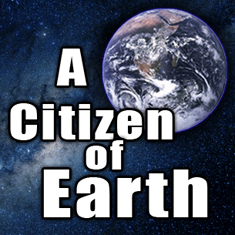 Would you believe me if I told you “government” doesn’t really exist? That when we talk about government, there’s nothing really there? It’s as fictional as religion?
Would you believe me if I told you “government” doesn’t really exist? That when we talk about government, there’s nothing really there? It’s as fictional as religion?
So where do I think all those government buildings come from? What’s all that business you see in Washington DC — Congress and the White House, the Supreme Court and all those museums and monuments and stuff? What’s the deal with all the cop cars, and the uniformed people driving them? What do I think the IRS is, or the U.S. Army? What exactly is the local fire department, the school district, the Water Board, the city and county office buildings? What about all that sheer government POWER??
It’s just this: People pretending — or agreeing — government exists.
Oh, the buildings are there, sure enough, but they’re really no different from other buildings. They’re things people build for some purpose. But the something-or-other inside them, that’s just a bunch of people playing an elaborate game of make-believe. The game of “Let’s Pretend Government Exists.” And the power?
Let me see if I can explain it.
Say John Smith wants Bob Jones to do something for him. There’s a range of persuasions that can be called into play to make this happen. At one end is the generosity and goodwill of Bob toward his friend John, and all John has to do is suggest he needs the thing done, and Bob will jump to do it. At the other end, John holds a gun to Bob’s head and orders him to do it.
In between is John the cop flashing his lights at Bob the driver, John the distant tax collection official and Bob the annual tax-return-filer, John the teacher announcing a pop quiz to Bob the student, John the storekeeper telling Bob the shopper the total will be $27.16, John the preacher telling Bob the parishioner to say ten Hail Marys.
But in each case, and all the cases between those two extremes, there’s a hidden agreement. Bob agrees that John has the power over him. He PERMITS it.
The agreement is “You pretend you’re a teacher, I’ll pretend you’re a teacher, and we’ll proceed as if that’s something real.” For human social reasons, it’s real. But in any other way, it’s a pretense.
Even if John is President of the United States, or a four-star general, he’s just one guy, right? And so is Bob. Discount for a second the fact that one of them might be physically stronger than the other, and you have one unit of human power facing one unit of human power. EVERYTHING ELSE is that agreement. Bob agrees that John has the right to tell him what to do. Bob agrees to do it.
He doesn’t have to. He can say no. You might say “Well, John might kill him for it,” and yes, that’s true. But how many civilized situations really involve the imminent threat of death? Very few.
But in reality, John has one unit of human power, and only one … until Bob AGREES that he will lend John his power by doing what John wants.
Toss some other people into the mix. Say John is a four-star general. Surround him with a thousand obedient soldiers. In addition to his own single unit of human power, now John has the power of a thousand soldiers, plus the power of Bob. But only so long as the thousand-and-one people AGREE they will obey John. Only as long as they willingly PERMIT the general to have that power over them.
Fame is a sort of power. So is wealth. Every aspect of human social and political power is this same sort of thing. Put a billionaire — or a rock star, the leader of a country, a military dictator, any sort of powerful person you might imagine — into a huge empty stadium by himself, and he will again have only one unit of human power. This is why “powerful” people MUST be constantly surrounded by legions of sycophants — servants, toadies, secretaries, guards, henchmen, flower girls and all the rest.
Power in the human sphere comes only by the agreement of the people in the sociopolitical structure within which the power displays.
The democratic model of government is fairly open about this. In nations where political office depends on voters, there’s a recognition that “the people” are the ultimate deciders as to who has power and who doesn’t.
Every “rise to power” — think political campaigns, but also the rise of Hitler — occurs along a lengthy road on which the people being powered-over become gradually convinced, one by one, that they’re willing to cede their own power to the leader. They PERMIT the leader to become powerful by agreeing that he is powerful, and by acting, or refraining from acting, according to the leader’s wishes.
A totalitarian government works no differently as far as the source of power, but it conceals from the underlings any suggestion that their leader — or tyrant — is anything but massively more powerful than them. Yet his power comes only through consent of the henchmen and carriers-out-of-orders, and the fearful-but-willing acquiescence of the populace. You can scare people into fearful obedience, and it works for exactly as long as you can keep them scared.
No one enjoys being afraid, though. It’s why we came up with the democratic social model in which leaders are chosen by the people, each with his one vote which says “Yes, I’ll pretend you have the right to tell me what to do, and I’ll allow you to pretend to lead me.”
But in this social model, just how much “right to tell me what to do” do we give away? To answer that, we first have to realize that in the democratic model, the “leader” position exists not for the purpose of ruling over people, but for doing certain larger social work the individual knows needs to be done, but is unable to do, or chooses not to do, himself. The “ruling over” part of it exists ONLY in the pursuit of that larger work.
So here I am, John Q. Public, and I’m lending out some power to a police officer. How much do I lend him? Exactly the amount needed to do the job of keeping the peace and enforcing the necessary regulations. No more.
If you picture power as gasoline, and imagine a cop needs 13 gallons to do his job each day, we-the-public would provide him 13 gallons, possibly a touch more for unforeseen circumstances. But no more. We wouldn’t give him 38 gallons, or 70 gallons.
So a police officer does NOT have any extra power outside the bounds of his job. And even in his job, there are limits.
We don’t give him permission to beat his wife, for instance, to intimidate his kid’s schoolteacher into giving all A’s, or to beat down some guy he takes a dislike to in an after-hours bar disagreement. All of those are clearly abuses of power, and we cut it off as soon as we find out about it. If the driver in a traffic stop gives him lip, we don’t agree that he can shoot the guy 36 times, killing him.
There’s some inevitable slop. You and I don’t have free rein to drive 90 miles per hour on the highway, but we somewhat grudgingly allow cops to do it. Not to race to get donuts, or to pick up his laundry before the cleaners closes, but to attend to NECESSARY duties which we assume he’s doing. As we don’t know what he’s doing, though, he’s free to skate over the line at least a little bit for his own purposes.
It’s this “skating over the line” I really want to talk about, though.
The job of policing, tax collecting, being a Congressman, operating a toll booth, all require a certain amount of lent power to accomplish the official duties. We lend exactly the amount necessary, and not one jot more.
A police car is a bit of borrowed power. We might agree that a police officer could need to take his patrol car home with him, but we’d end his power to drive it after he gets home. If he leaves home for a shopping trip, or to take his daughter to a Little League game, we’d expect him to take his own car. Taking his patrol car would be a clear abuse of his borrowed power.
One of the consequences of such actions, if we assume power lent to do a job comes in limited amounts, is that every bit of power diverted to private goals makes the person less able to do his job. There just isn’t enough power.
There are two main points here.
One is that borrowed power has limits, the limit in each case being the boundary of permission of those lending the power. We all of us lend out our power for officials to do their jobs, but we lend out EXACTLY the amount of power to do the job, and no more.
So every official who uses the power of his position to accomplish his own private goals or feather his own nest is not only abusing the power of his office, he is also making himself less able to do his job. Just as if he used 5 gallons of provided gasoline to run his own private errands, he’d be 5 gallons down on the amount needed to perform his duties.
Second is that the power can be taken back. We can do it through the voting process, by removing the person from that office. Or we can do it ourselves by refusing to recognize the power of that one PERSON to order or rule us.
So what does all this have to do with day-to-day living? Not much, admittedly, under normal conditions.
I still think it’s important to keep in mind the situation, though, the origins and limits of power, in case you (we!) ever decide to make other choices about how much and to whom you’re lending it.
Power is purely a belief. There are no powerful people, except those we pretend are powerful.
 Pug dogs are an abomination. There, I said it. Someone had to.
Pug dogs are an abomination. There, I said it. Someone had to.

